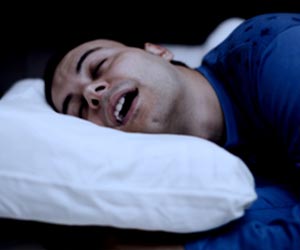- Chronic mouth breathing is linked to sleep apnea and other serious health issues
- Mouth breathing can cause poor oral health, including cavities and gum disease
- Nasal breathing enhances immune function and promotes better sleep quality
Sleeping with your mouth open can have a big impact on your health because it often implies poor nocturnal breathing, which can lead to a variety of health issues. Chronic mouth breathing is closely linked to sleep apnea, a disorder that, if not treated, can lead to major health issues such as cardiovascular disease, high blood pressure, and diabetes (1).
Advertisement
Symptoms of Sleeping with Your Mouth Open
According to Rakesh Goyal, a pulmonologist at S.G.M Indira Hospital, adults who have this habit frequently have dry mouth, sore throat, poor oral health (including gum disease and tooth decay), bad breath, snoring, morning headaches, daytime lethargy, brain fog. These symptoms indicate poor sleep quality, leaving people fatigued despite a full night’s sleep.
Children who sleep with their mouths open may experience difficulty concentrating, ADHD-like symptoms, decreased growth, difficulty controlling emotions, excessive fatigue, and oral health issues. It’s vital to distinguish between mouth breathing and ADHD because the former can resemble the latter’s symptoms.
Advertisement
Health Consequences of Sleeping with Your Mouth Open
Mouth breathing can cause serious oral and overall health complications. Saliva, which is necessary for maintaining oral health by neutralizing bacteria and restoring tooth enamel, dries out, increasing the risk of cavities, gum disease, and oral infections. Poor face and jaw growth in children, as well as foul breath and plaque formation, are all frequent, according to Goyal.
Furthermore, nocturnal mouth breathing can result in obstructive sleep apnea (OSA), a condition in which the airway becomes clogged during sleep, forcing the tongue to fall back and restricting airflow (2). This can lead to cardiovascular illness, type 2 diabetes, liver issues, depression, infertility, and cognitive impairment.
Advertisement
Treatment to Improve Sleeping with Mouth Condition
Orthodontics:
Braces and aligners help realign the jaw and teeth, increasing ventilation.
Mouth taping:
This procedure seals the lips and prevents mouth breathing (3).
Myofunctional therapy:
It is physical therapy for the mouth and throat muscles that help keep the airway open.
Surgery:
It can be used to remove swollen tissues that constrict the airway, such as the tonsils and adenoids.
Nose decongestants and antihistamines:
These drugs relieve nose congestion and promote nasal breathing.
Risk Factors for Night Time Mouth Breathing
According to Goyal, people with long, narrow faces, high palate, gummy grins, crowded teeth, malocclusions, allergies, or obesity are more likely to develop the condition. Recognizing these variables can aid in obtaining timely treatment from airway health specialists.
Benefits of Nasal Breathing
Nasal breathing has many health benefits. It boosts the immune system by creating nitric oxide, which helps fight infections. The nose modifies the air by humidifying and warming it, making it easier on the lungs. Nasal hair and cilia remove dust and allergens, while nasal secretions carry antibodies that combat bacteria and viruses. Nasal breathing helps children’s facial and airway development, preventing biting difficulties.
References:
- Obstructive sleep apnea and cardiovascular disease
Butt M, Dwivedi G, Khair O, Lip GY. Obstructive sleep apnea and cardiovascular disease. Int J Cardiol. 2010 Feb 18;139(1):7-16. doi: 10.1016/j.ijcard.2009.05.021. Epub 2009 Jun 7. PMID: 19505734. - Mouth opening/breathing is common in sleep apnea and linked to more nocturnal water loss
Yi-Fong Su V, Chou KT, Tseng CH, Kuo CY, Su KC, Perng DW, Chen YM, Chang SC. Mouth opening/breathing is common in sleep apnea and linked to more nocturnal water loss. Biomed J. 2023 Jun;46(3):100536. doi: 10.1016/j.bj.2022.05.001. Epub 2022 May 10. PMID: 35552020; PMCID: PMC10209680. - The Impact of Mouth-Taping in Mouth-Breathers with Mild Obstructive Sleep Apnea: A Preliminary Study
Lee YC, Lu CT, Cheng WN, Li HY. The Impact of Mouth-Taping in Mouth-Breathers with Mild Obstructive Sleep Apnea: A Preliminary Study. Healthcare (Basel). 2022 Sep 13;10(9):1755. doi: 10.3390/healthcare10091755. PMID: 36141367; PMCID: PMC9498537.
Source-Medindia



